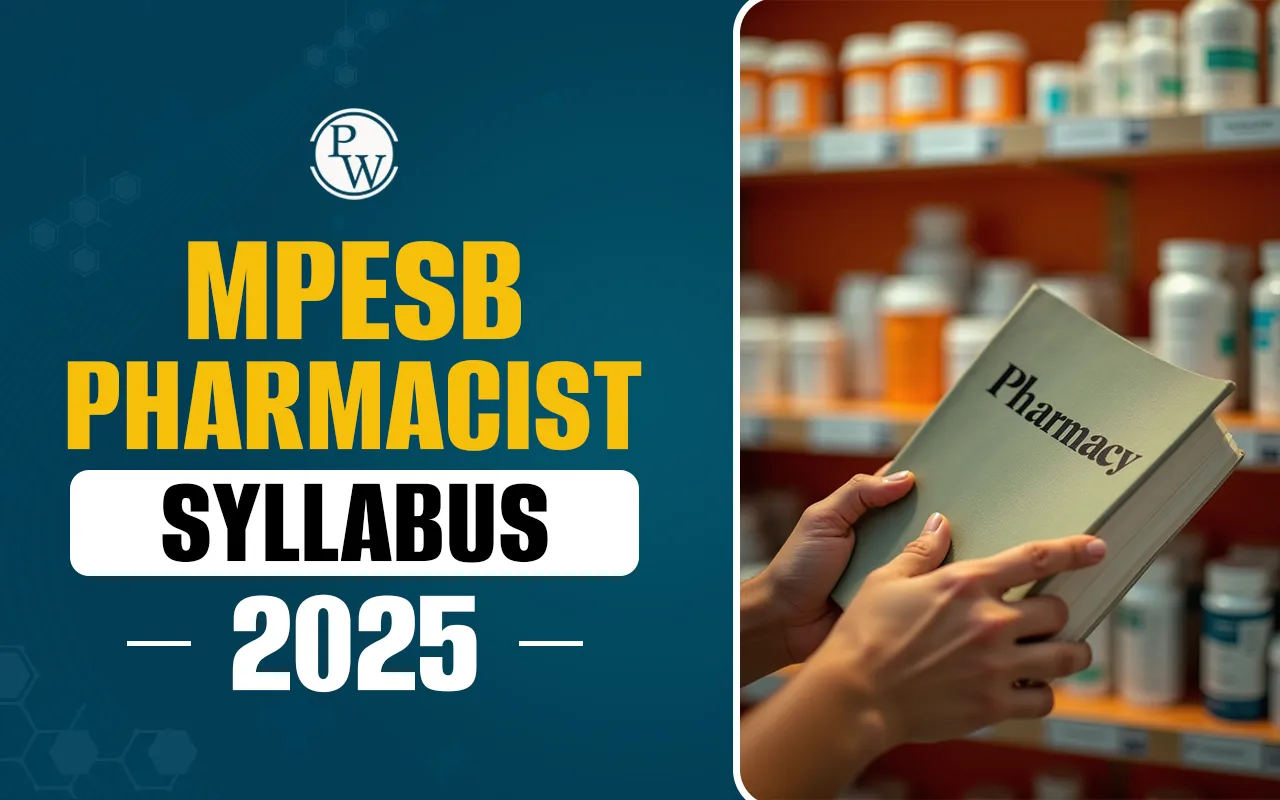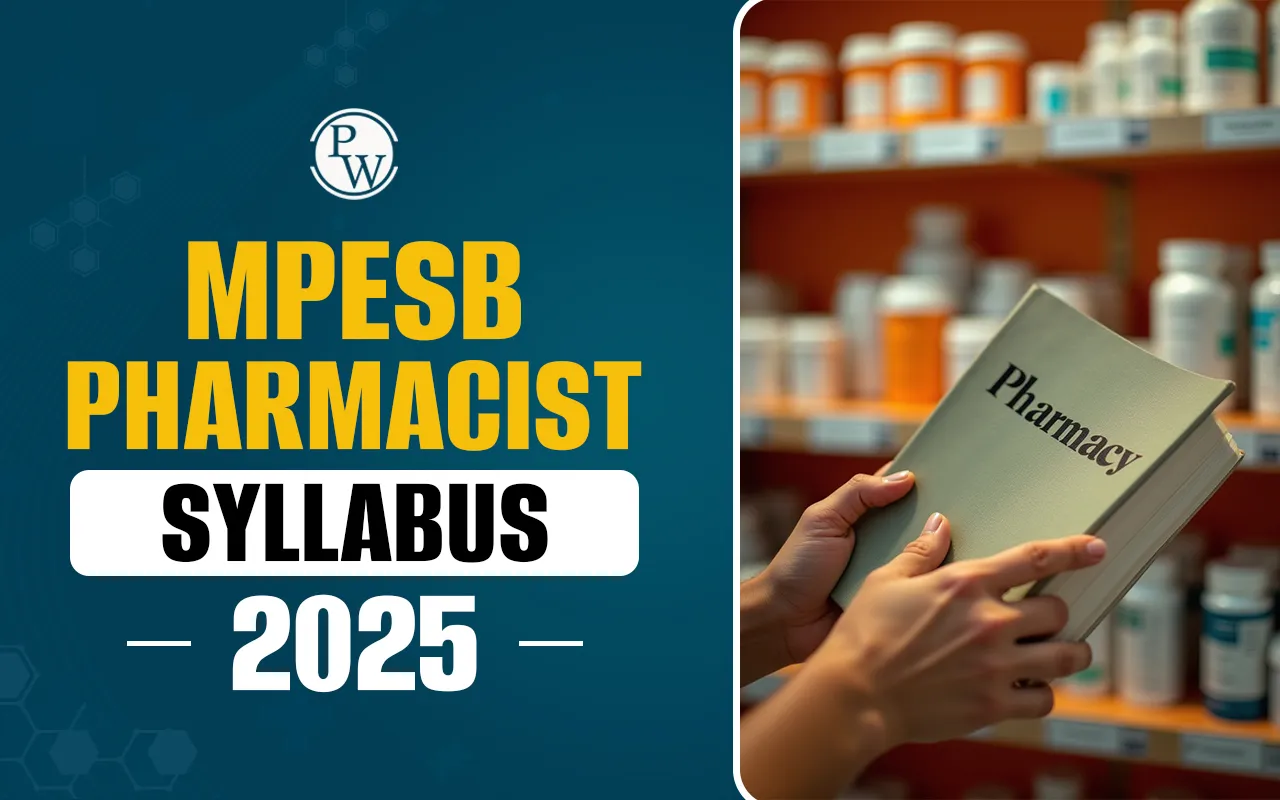

MPESB Pharmacist Syllabus 2025 includes subjects from General Knowledge, Science, Hindi, English, and core pharmacy fields like Pharmaceutics, Pharmacology, Biochemistry, Pharmacognosy, and Clinical Pathology. The syllabus is divided into two parts—Part A covers general topics for aptitude and reasoning, while Part B focuses on technical pharmacy knowledge required for professional practice. The exam will be conducted in online mode (CBT) starting from 27th September 2025, with a total of 100 multiple-choice questions.
Candidates who wish to secure a government pharmacist job in Madhya Pradesh through MPESB should begin their preparation well in advance. A clear understanding of the detailed syllabus, exam pattern, and marking scheme is essential for scoring high. Below is a complete breakdown of all important information to help you prepare effectively for the MPESB Pharmacist Recruitment 2025.
MPESB Pharmacist Syllabus 2025 Overview
Candidates preparing for the Madhya Pradesh Pharmacist Recruitment Test 2025 under MPESB should understand the official syllabus and exam structure. The syllabus consists of general subjects and core pharmacy subjects like Pharmaceutics, Pharmacology, Biochemistry, Community Pharmacy, etc. The recruitment exam will be conducted online in multiple shifts starting from 27th September 2025.
| MPESB Pharmacist Syllabus 2025 Overview | |
| Particulars | Details |
| Exam Name | MPESB Pharmacist (Grade-2) Recruitment Test 2025 |
| Conducting Body | MP Employees Selection Board (MPESB), Bhopal |
| Official Website | esb.mp.gov.in |
| Selection Process | Written Exam & Document Verification |
| Exam Date | From 27th September 2025 |
| Exam Mode | Online (Computer-Based Test) |
| Exam Duration | 2 Hours (120 Minutes) |
| Total Questions | 100 Questions |
| Question Type | Multiple Choice Questions (MCQ) |
| Syllabus Division | Part A (25 Marks), Part B (75 Marks) |
| Negative Marking | Yes (¼ mark deducted for wrong answers) |
MPESB Pharmacist Syllabus 2025 PDF
The MPESB Pharmacist Syllabus 2025 PDF includes important topics like Pharmaceutics, Pharmaceutical Chemistry, Pharmacognosy, Biochemistry & Clinical Pathology, Human Anatomy & Physiology, Health Education & Community Pharmacy. Candidates can download the complete syllabus PDF provided here to prepare for the exam in a well-structured manner.
MPESB Pharmacist Syllabus 2025 (Part-1)
Part-1 (25 Marks) includes general topics necessary for basic aptitude and understanding. Subjects are:
-
General Knowledge
-
General Hindi
-
General English
-
General Mathematics
-
General Science
-
General Reasoning and Aptitude
These subjects test your comprehension, logic, and overall mental ability.
MPESB Pharmacist Syllabus 2025 (Part-2)
Part-2 (75 Marks) is subject-specific and covers core pharmacy topics. The detailed subject list includes:
-
Pharmaceutics
-
Pharmaceutical Chemistry
-
Pharmacognosy
-
Biochemistry & Clinical Pathology
-
Human Anatomy & Physiology
-
Health Education & Community Pharmacy
-
Dispensing Pharmacy
-
Pharmacology and Toxicology
-
Pharmaceutical Jurisprudence
MPESB Pharmacist Subject Wise Syllabus 2025
MPESB Pharmacist Syllabus 2025 includes detailed subject-wise topics from Pharmaceutics, Pharmaceutical Chemistry, Pharmacognosy, and more. Candidates must prepare both technical and general subjects to excel in the exam.
PHARMACEUTICS
Introduction, Familiarization with new drug delivery systems. Introduction to Pharmacopoeias with special reference to the Indian Pharmacopoeia. Size reduction, size separation, metrology—system of weights and measures. Percentage calculations and adjustment of products. Use of the allegation method in calculations. Isotonic solutions. Mixing and homogenization. Packaging of pharmaceuticals. Extraction and galenicals, clarification and filtration, heat processes, introduction to drying processes, distillation. Sterilization—concept of sterilization and its differences from disinfection; thermal resistance of microorganisms. Detailed study of different sterilization processes. Study of immunological products like sera, vaccines, toxoids, and their preparations. Processing of tablets, processing of capsules.
PHARMACEUTICAL CHEMISTRY
Acids, bases, and buffers. Topical agents: (i) Protectives, (ii) Antimicrobials and astringents, (iii) Sulphur and its compounds, (iv) Astringents—alum and zinc sulphate. Dental products. Inhalants. Respiratory stimulants. Expectorants and emetics. Antidotes. Major intra- and extracellular electrolytes. Inorganic official compounds of iron, iodine, and calcium—such as ferrous sulfate and calcium gluconate. Radiopharmaceuticals and contrast media; radioactivity. Identification tests for cations and anions as per the Indian Pharmacopoeia. Quality control of drugs and pharmaceuticals.
PHARMACOGNOSY
Definition, history, and scope of Pharmacognosy, including indigenous systems of medicine. Various systems of classification of drugs of natural origin. Adulteration and drug evaluation; significance of pharmacopoeial standards. Therapeutic efficacy of:
(a) Laxatives
(b) Cardiotonics
(c) Carminatives and gastrointestinal regulators – catechu, hyoscyamus, belladonna, aconite, ashwagandha, ephedra, opium, cannabis, nux vomica, rauwolfia, vasaka, tolu balsam, tulsi, guggal, colchicum, vinca, chaulmoogra oil, pterocarpus, gymnema sylvestre, gokhru, punarnava, ipecacuanha, benzoin, myrrh, neem, curcuma, cinchona, ergot, shark liver oil, amla, papaya, diastase, and yeast.
Study of the source, preparation, and identification of fibres used in sutures and surgical dressings—cotton, silk, wool, and regenerated fibres.
BIOCHEMISTRY AND CLINICAL PATHOLOGY
Introduction to biochemistry. Brief chemistry and roles of carbohydrates, proteins, and lipids, including their classification and associated diseases. Brief chemistry and functions of vitamins and coenzymes. Basic concept of enzymatic activity. Introduction to the pathology of blood and urine.
HUMAN ANATOMY AND PHYSIOLOGY
Definition of various terms used in anatomy and physiology. Structure of the cell and functions of its components, with special reference to mitochondria and microsomes. Elementary tissues of the body. Composition of blood, blood groups, and the process of blood coagulation. Names and functions of lymph glands. Brief overview of the anatomy and physiology of different body systems.
HEALTH EDUCATION & COMMUNITY PHARMACY
Concept of health—definition, indicators of health, and the concept and prevention of diseases. Relationship between environment and health. First aid and emergency treatment in cases of shock, snake bites, burns, poisoning, heart diseases, fractures, and resuscitation methods. Elements of minor surgery and dressings. Fundamental principles of microbiology and common disease-causing organisms.
Overview of non-communicable diseases—their causative agents, prevention, care, and control, including cancer, diabetes, blindness, and cardiovascular diseases. Communicable diseases—their causative agents, modes of transmission, and prevention methods:
(a) Respiratory infections—chickenpox, measles, influenza, diphtheria, whooping cough, tuberculosis
(b) Intestinal infections—poliomyelitis, hepatitis, cholera, typhoid, food poisoning, hookworm
(c) Arthropod-borne infections—plague, malaria, filariasis
(d) Surface infections—rabies, trachoma, tetanus, leprosy
(e) Sexually transmitted diseases—syphilis, gonorrhoea, AIDS
Topics also include nutrition and health, vitamins and minerals, demography and family planning (natural, chemical, mechanical, hormonal methods), and India's population problem. Epidemiology—immunity and immunization, immunological products and their dosage schedules. Principles of disease control and prevention, including hospital-acquired infections and their prevention and control.
DISPENSING PHARMACY Prescriptions
Reading and understanding of prescriptions; identification of incompatibilities in prescriptions. Posology: study of doses and dosage of drugs.
Dispensed Medications include:
(i) Powders
(ii) Liquid oral dosage forms
(iii) Biphasic liquid dosage forms:
• Suspensions
• Emulsions
(iv) Dental and cosmetic preparations
(v) Semi-solid dosage forms:
• Ointments
• Emulsification techniques
(vi) Sterile dosage forms:
• Parenteral dosage forms
• Sterility testing
• Ophthalmic products.
PHARMACEUTICAL CHEMISTRY II
Chemistry of pharmaceutical organic compounds, covering their nomenclature, chemical structure, uses, and important physical and chemical properties. Study of the stability, storage conditions, and various types of pharmaceutical formulations of these drugs.
Pharmacology and Toxicology
Introduction to pharmacology and its scope. Routes of drug administration, along with their advantages and disadvantages. Metabolism, distribution, and excretion of drugs. General mechanism of drug action and factors that modify it.
Pharmacological classification of drugs, including:
(i) Drugs acting on the central nervous system:
(a) General anaesthetics and intravenous anaesthetics
(b) Analgesics, antipyretics, sedatives, hypnotics, and anticonvulsants
(ii) Local anaesthetics
(iii) Drugs acting on the autonomic nervous system
(iv) Drugs acting on the eye
(v) Drugs acting on the respiratory system
(vi) Antacids
(vii) Cardiovascular drugs
(viii) Drugs acting on the blood and blood-forming organs
(ix) Drugs affecting renal function
(x) Hormones and hormone antagonists
(xi) Drugs acting on the digestive system
MPESB Pharmacist Exam Pattern 2025
The MPESB Pharmacist Exam 2025 consists of two parts—Part A and Part B—covering a total of 100 multiple-choice questions. Part A tests general aptitude, while Part B focuses on pharmacy-related subjects. Each question carries 1 mark, making the total marks 100.
|
MPESB Pharmacist Exam Pattern 2025 |
|||
|
Section |
Subjects Covered |
Questions |
Marks |
|
Part A |
General Knowledge, Hindi, English, Math, Science, Reasoning |
25 |
25 |
|
Part B |
Pharmacy Technical Subjects |
75 |
75 |
|
Total |
100 |
100 |
|
Duration: 2 Hours
Mode: Online (Computer-Based Test)
MPESB Pharmacist Marking Scheme 2025
MPESB Pharmacist Recruitment exam follows a clear marking system. Candidates get +1 mark for each correct answer.
-
+1 mark for every correct answer.
-
0 marks for unanswered questions.
So be careful while answering. Try not to guess if you're unsure.
MPESB Pharmacist Exam Preparation Tips
The MPESB Pharmacist Exam is on 27 September 2025, so now is the best time to study smartly. Here are some simple tips to help you get ready easily before the MPESB Pharmacist exam .
-
Understand the syllabus thoroughly – Focus on Part A & Part B topics.
-
Make a study timetable – Divide time daily for general and pharmacy subjects.
-
Practice previous year papers – Know the question pattern and difficulty level.
-
Use standard books – Refer to D.Pharm/B.Pharm textbooks as per the syllabus.
-
Revise regularly – Weekly revisions will strengthen your memory.
-
OMR/CBT familiarity – Know how to mark answers on a screen-based or paper-based test.



